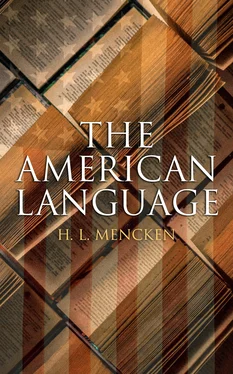1 ...8 9 10 12 13 14 ...21 59.Alfred L. Elwyn, M. D.: Glossary of Supposed Americanisms ...; Phila., 1859.
60.John S. Farmer: Americanisms Old and New ...; London, 1889.
61.Sylva Clapin: A New Dictionary of Americanisms, Being a Glossary of Words Supposed to be Peculiar to the United States and the Dominion of Canada; New York, 1902.
II. THE BEGINNINGS OF AMERICAN
Table of Contents
Table of Contents
—William Gifford, the first editor of the Quarterly Review, is authority for the tale that some of the Puritan clergy of New England, during the Revolution, proposed that English be formally abandoned as the national language of America, and Hebrew adopted in its place. An American chronicler, Charles Astor Bristed, makes the proposed tongue Greek, and reports that the change was rejected on the ground that "it would be more convenient for us to keep the language as it is, and make the English speak Greek." 1The story, though it has the support of the editors of the Cambridge History of American Literature, 2has an apocryphal smack; one suspects that the savagely anti-American Gifford invented it. But, true or false, it well indicates the temper of those times. The passion for complete political independence of England bred a general hostility to all English authority, whatever its character, and that hostility, in the direction of present concern to us, culminated in the revolutionary attitude of Noah Webster's "Dissertations on the English Language," printed in 1789. Webster harbored no fantastic notion of abandoning English altogether, but he was eager to set up American as a distinct and independent dialect. "Let us," he said, "seize the present moment, and establish a national language as well as a national government.... As an independent nation our honor requires us to have a system of our own, in language as well as government."
Long before this the challenge had been flung. Scarcely two years after the Declaration of Independence Franklin was instructed by Congress, on his appointment as minister to France, to employ "the language of the United States," not simply English, in all his "replies or answers" to the communications of the ministry of Louis XVI. And eight years before the Declaration Franklin himself had drawn up a characteristically American scheme of spelling reform, and had offered plenty of proof in it, perhaps unconsciously, that the standards of spelling and pronunciation in the New World had already diverged noticeably from those accepted on the other side of the ocean. 3In acknowledging the dedication of Webster's "Dissertations" Franklin endorsed both his revolt against English domination and his forecast of widening differences in future, though protesting at the same time against certain Americanisms that have since come into good usage, and even migrated to England. 4
This protest was marked by Franklin's habitual mildness, but in other quarters dissent was voiced with far less urbanity. The growing independence of the colonial dialect, not only in its spoken form, but also in its most dignified written form, had begun, indeed, to attract the attention of purists in both England and America, and they sought to dispose of it in its infancy by force majeure . One of the first and most vigorous of the attacks upon it was delivered by John Witherspoon, a Scotch clergyman who came out in 1769 to be president of Princeton in partibus infidelium . This Witherspoon brought a Scotch hatred of the English with him, and at once became a leader of the party of independence; he signed the Declaration to the tune of much rhetoric, and was the only clergyman to sit in the Continental Congress. But in matters of learning he was orthodox to the point of hunkerousness, and the strange locutions that he encountered on all sides aroused his pedagogic ire. "I have heard in this country," he wrote in 1781, "in the senate, at the bar, and from the pulpit, and see daily in dissertations from the press, errors in grammar, improprieties and vulgarisms which hardly any person of the same class in point of rank and literature would have fallen into in Great Britain." 5It was Witherspoon who coined the word Americanism —and at once the English guardians of the sacred vessels began employing it as a general synonym for vulgarism and barbarism. Another learned immigrant, the Rev. Jonathan Boucher, soon joined him. This Boucher was a friend of Washington, but was driven back to England by his Loyalist sentiments. He took revenge by printing various charges against the Americans, among them that of "making all the haste they can to rid themselves of the [English] language."
After the opening of the new century all the British reviews maintained an eager watchfulness for these abhorrent inventions, and denounced them, when found, with the utmost vehemence. The Edinburgh, which led the charge, opened its attack in October, 1804, and the appearance of the five volumes of Chief Justice Marshall's "Life of George Washington," during the three years following, gave the signal for corrective articles in the British Critic, the Critical Review, the Annual, the Monthly and the Eclectic. The British Critic, in April, 1808, admitted somewhat despairingly that the damage was already done—that "the common speech of the United States has departed very considerably from the standard adopted in England." The others, however, sought to stay the flood by invective against Marshall and, later, against his rival biographer, the Rev. Aaron Bancroft. The Annual, in 1808, pronounced its high curse and anathema upon "that torrent of barbarous phraseology" which was pouring across the Atlantic, and which threatened "to destroy the purity of the English language." 6In Bancroft's "Life of George Washington" (1808), according to the British Critic, there were gross Americanisms, inordinately offensive to Englishmen, "at almost every page."
The Rev. Jeremy Belknap, long anticipating Elwyn, White and Lounsbury, tried to obtain a respite from this abuse by pointing out the obvious fact that many of the Americanisms under fire were merely survivors of an English that had become archaic in England, but this effort counted for little, for on the one hand the British purists enjoyed the chase too much to give it up, and on the other hand there began to dawn in America a new spirit of nationality, at first very faint, which viewed the differences objected to, not with shame, but with a fierce sort of pride. In the first volume of the North American Review William Ellery Channing spoke out boldly for "the American language and literature," 7and a year later Pickering published his defiant dictionary of "words and phrases which have been supposed to be peculiar to the United States." This thin collection of 500 specimens set off a dispute which yet rages on both sides of the Atlantic. Pickering, however, was undismayed. He had begun to notice the growing difference between the English and American vocabulary and pronunciation, he said, while living in London from 1799 to 1801, and he had made his collections with the utmost care, and after taking counsel with various prudent authorities, both English and American. Already in the first year of the century, he continued, the English had accused the people of the new republic of a deliberate "design to effect an entire change in the language" and while no such design was actually harbored, the facts were the facts, and he cited the current newspapers, the speeches from pulpit and rostrum, and Webster himself in support of them. This debate over Pickering's list, as I say, still continues. Lounsbury, entrenched behind his grotesque categories, once charged that four-fifths of the words in it had "no business to be there," and Gilbert M. Tucker 8has argued that only 70 of them were genuine Americanisms. But a careful study of the list, in comparison with the early quotations recently collected by Thornton, seems to indicate that both of these judgments, and many others no less, have done injustice to Pickering. He made the usual errors of the pioneer, but his sound contributions to the subject were anything but inconsiderable, and it is impossible to forget his diligence and his constant shrewdness. He established firmly the native origin of a number of words now in universal use in America— e. g. , backwoodsman , breadstuffs , caucus , clapboard , sleigh and squatter —and of such familiar derivatives as gubernatorial and dutiable , and he worked out the genesis of not a few loan-words, including prairie , scow , rapids , hominy and barbecue . It was not until 1848, when the first edition of Bartlett appeared, that his work was supplanted.
Читать дальше












